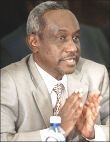Sudan says full disarmament of militias by end of month not “practical”
 LONDON, Aug 14, 2004 (AP) — Sudan’s vice president said in an interview broadcast Saturday that it is not “practical” to disarm Arab militias blamed for the deaths of thousands of black Africans by the end of this month.
LONDON, Aug 14, 2004 (AP) — Sudan’s vice president said in an interview broadcast Saturday that it is not “practical” to disarm Arab militias blamed for the deaths of thousands of black Africans by the end of this month.
On July 30, the United Nations Security Council gave Sudan 30 days to quell ethnic violence in the vast western Darfur region or face economic or diplomatic penalties.
“We are doing our best to meet that deadline but definitely, due to logistical problems and limitations we have at the moment, I don’t think the time frame is practical,” Vice President Ali Osman Mohammed Taha told the British Broadcasting Corp., in an interview recorded on Aug. 9.
Fighting between Arab militias and the black African population has killed thousands of people and forced more than 1 million to flee their homes. International rights groups say the government has backed the janjaweed — nomadic Arab militia — in an ethnic cleansing campaign against the African villagers.
The government has strongly denied the accusations, saying the fighting was a result of tribal conflicts over land and water resources.
Darfur’s troubles stem from long-standing tensions between nomadic Arab tribes and African farm communities. Those tensions exploded in February 2003 when two African rebel groups, the Sudanese Liberation Army and the Justice and Equality Movement, took up arms over what they regard as unjust treatment by the government.
Since then, the janjaweed have burned villages and slaughtered farmers across the region.
Taha told the BBC that the rebels must also be disarmed.
“The government has already started disarming the janjaweed and other militias but we say clearly that we cannot begin to have comprehensive stability without having disarmed both sides,” he said.
Taha said the presence of 80 African Union observers in Darfur was “acceptable at the moment,” but he questioned the need for international troops.
“I don’t think the presence of international troops in Darfur would help providing security. What we do feel that if international security came to Darfur, that would aggravate the situation rather than pacifying it,” he added.
